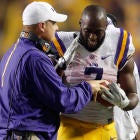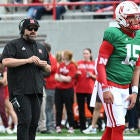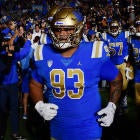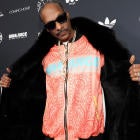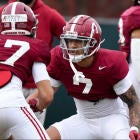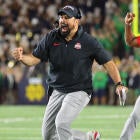HOOVER, Ala. -- LSU football coach Les Miles, like many of us, is trying to comprehend another week of horrific violence that tore at the very fiber of America.
We are numb and heartbroken and depressed. We hope there's ways we can rise above atrocities that feel never-ending while embracing our differences. We know division over race has lasted forever and won't go away anytime soon, and yet, we yearn for a better way forward.
How do you talk with each other to avoid the gruesome killings of two black men by police officers in Baton Rouge, Louisiana, and Falcon Heights, Minnesota, and then a coward killing five white police officers in Dallas? How do we get to the core of our differences, emphasize with others that they walk in different shoes, and clearly see that life trumps any kind of discriminatory outrage?
I don't pretend to have the answers. Neither does Miles. But he knows we need to try.
So as protests continue in Baton Rouge over the death of Alton Sterling, Miles has called five meetings with his football team, whose racial composition is about 70 percent black and 30 percent white.
"And I didn't do a damn good job, either," Miles said, shaking his head. "I had a tough time reconciling the difference in our team room and what I was seeing outside, and I mean outside from California to Tennessee, including Florida and The Pulse [nightclub in Orlando]. You get overwhelmed."
By that, Miles means that sports in 2016 usually divides not by race or religion but by merit and effort and contributions to the team. The locker room is where relationships from different backgrounds are built because you're teammates, and teammates have each other's back. Someday, one of those teammates may be the best man in your wedding.
"What I wished is that the culture would represent my team room," Miles said wistfully in a candid interview.
Maybe sports can provide a path toward a better future for an imperfect country. That's not meant to overlook how far race relations has come, nor should it be viewed as naive given how far we still must go.
But as AL.com's Joseph Goodman wrote in a thought-provoking column that's worth a read: "Where else in this country do black lives matter more to white people than a football field in the South?" If you're in the "stick to sports" crowd about race, it's far too late for that approach in America.
"I tell [people who say 'stick to sports'] I can't do that," said Missouri defensive end Charles Harris, who took part in his football team's protest over race on campus last fall. "I can't just be an athlete; I have to be a person."
Leonard Fournette: 'I have a voice'
Increasingly, pro and college athletes are embracing their platform to talk about race and violence. Star LSU running back Leonard Fournette tweeted a picture of himself wearing a T-shirt of Sterling, the black man whose point-blank shooting by white police set off a new round of national protest against police aggression against black people.
Alton sterling.... pic.twitter.com/mkkPnkFvT9
— 7⃣ (@_fournette) July 7, 2016
"I have a voice. Why not use that platform?" said Fournette, the potential No. 1 pick in next year's NFL Draft. "My main message to everybody is just keep praying for change, and that's not just in Baton Rouge, that's all over the world. It got to some of us. Somehow, there needs a change because another thing we have in our generational problem is people growing up without their fathers, and one of the main reasons is they have no discipline and they're not there with their fathers."
Fournette said the events of the past week brought back memories of Hurricane Katrina, when as a child in New Orleans he lived on a bridge for five nights and saw countless dead bodies. The recent shootings are another reminder to Fournette that the world needs to change.
"Just preparing myself for the future," he said. "My child has to grow up in this type of environment."
Missouri linebacker Michael Scherer said the last week shows there are "evil people" in the world who do bad things every day.
"Either everyone can come together and beat these evil people, or people can separate and that's what these evil people want and it's going to get worse from there," Scherer said. "If you look at sports programs like ours, or every program that walks through this building this week, there are kids from different races, different backgrounds, different ethnicity, different religious, different economic backgrounds, and all these kids come together as a team."
Why can sports seemingly bring races together more than other parts of society?
"I think there's a different bond you get when you count on somebody, especially a sport like football," Scherer said. "It's physical. You count on somebody almost to protect you. Not necessarily your life, but sometimes your health. When you can trust someone on that level, I think you build a bond that cannot be broken."
Imagine if real dialogue between communities and police could eventually build that sort of trust.
Harris, the Missouri defensive end, said he has been racially profiled as a black man by police but declined to elaborate. "We all have our different experiences that kind of shape us who we are," he said. "But it's about being able to put that to the side and take the perspective of someone else."
Former Clemson defensive lineman D.J. Reader spoke to me last season at the College Football Playoff about the stereotypes he encountered growing up as a young black man in Greensboro, North Carolina.
"You'd walk past car doors and people would lock their doors," Reader said. "Even in the classroom, you have some people who don't expect you to do well in school because of what you look like. That's just the way things go. You go to smaller towns, it's hard. As soon as you break their stereotype, they look at you different. You really have to overcompensate to break those stereotypes."
Reader said he can't always forget those stereotypes that created hard feelings, but he learned to forgive.
"We've been working on race for so long that it's getting ridiculous to the point of why can't everybody just love each other?" Reader said. "But there's always going to be those 1 percenters and the 1 percenters always make everybody else look bad."
Miles, the longtime LSU coach, said some of the isolated shootings are racially based and questioned what the police officer in the Minnesota shooting death of Philando Castille was thinking. Miles qualified his remarks as hypothetical assuming Castille's fiancé was accurate that Castille told the officer on a traffic stop that he had a gun and was reaching for his wallet.
Miles said hearing that someone has a gun becomes an emotional trigger similar to when he tells a football player he's out of football until he improves his academic grades. When a player hears that news, Miles said he must repeat three times that his career isn't necessarily over. Miles' point: The player or officer only hears the emotional words without truly listening.
"[The officer's] brain didn't process right," Miles said. "He could not have done that. I mean, he got tight and he froze and he didn't know, and he said did they say wallet? Did they say gun? There's an emotional process."
In an attempt to add context, Miles appeared to draw a comparison between police receiving the benefit of the doubt when firing their guns to how women should get the same benefit when alleging sexual assault.
"This is where the pendulum swings," Miles said. "If a woman says you raped her and you thought it was consensual sex -- legitimately thought it was consensual sex -- you really did not think that there was anything unusual with it in any way, OK? The law is set up to protect her because she's small and not capable to protect herself. So the law is skewed irrespective of what you say towards her. She has the advantage.
"So now in the bedroom when she says, 'No,' no is really no and scares the [expletive] out of you. ... It's a natural skew to the legal system, OK?. I mean, you never hear about a male say, 'Then she pushed me down and choked on me.' Know what I'm saying? So the law is law to people. I think the policemen have gotten such a concern for their own life that they've become shooters quickly, and I think there needs to be some more compassion for life. That's all. The policeman's life and the people who deal with those policemen."
Why is race so hard to talk about in America?
In the days after the shootings over the past week, SEC commissioner Greg Sankey rewrote his annual media address. He felt something needed to be said because so much attention is paid to what the SEC does.
Sankey shared with the media a quote from Nelson Mandela in 2000 about how sports unite people and has the power to change the world:
"Peace is the greatest weapon mankind has to resolve even the most intractable difficulties. But to be an effective agent for peace, you have to seek not only to change the community and the world. What is more difficult is to change yourself before you seek to change others. Only those who have the courage to change themselves and to know that in all communities without exception there are good men and women who want to serve their communities."
Talking about peace, love and change may feel meaningless compared to the horrific reactions of violence. But what other choice do we have? Even if it takes athletes and coaches talking about race, that's better than not having the conversation at all.
This isn't to say college football is immune from disparities, problems and tension over race. It's not.
Last season, blacks made up 9 percent of the Football Bowl Subdivision head football coaches and 57 percent of the players. The commissioners, athletic directors and coaches are largely white; the players (i.e. the workforce) are largely black.
Based on 2014-15 federal graduation rates, black male athletes at the 65 Power Five schools graduated at a rate of 53.6 percent, lower than all athletes (68.5 percent), black undergraduate men (58.4 percent) and undergraduates overall (75.4 percent). A study by University of Pennsylvania professor Shaun Harper found that in 2014-15 black men made up 2.5 percent of undergraduate students at the Power Five schools, but comprised 56.3 percent of football teams and 60.8 percent of men's basketball teams.
Missouri's football protest was met with some backlash, especially when it helped result in the resignation of the university system president. Students on campus were protesting what they believed was systemic racism at the university. When the football players decided to stop practicing and playing until a graduate student ended his hunger strike, the entire team was not united. One player anonymously told ESPN that "half the team and coaches -- black and white -- are pissed."
Scherer, a white linebacker at Missouri, said the aftermath of the protest was tough. "Everybody that knows me that I came across in St. Louis, they approached me the same way," he said. "But in the back of my head I'm thinking, 'Do I come out and tell these people who I am?' Do I say, 'Hey, I'm Michael Scherer and I play Missouri football,' or do I keep that a secret? It was all in my head, but you definitely don't want to have that feeling of deciding what you should do."
Why is race so hard to talk about? I posed that question to some football coaches and players.
Harris, the Missouri defensive end: "I think because of the feedback that we'll get, the awkwardness you have when you look at somebody else that's not your race. But when you say white or you say black, there shouldn't be no weirdness about it. It's just a color, right? It's something that socially we conform. Scientifically, there's no reason for a race, right? However, we've come to distinguish ourselves and categorize ourselves as much as we possibly can and through that categorization we've made it to where we can't even relate to one another. In reality, we're all the same."
Barry Odom, Missouri's new coach: "I don't know but it is. Fortunately, the way I was brought up, it's not difficult for me to talk about that. But overall, as soon as that word or that topic is brought up, guys go quiet and backpedal a little bit, and that's not in 2016 the way this place should be."
Miles, LSU's coach: "Everybody's experiences are so different. You haven't had the same experiences. You don't see it the same way. I think exploring those conversations and keeping the dialogue open is important. Because I want you to know something: Our world is so much more fun with everybody. Let's just talk the way it is. You want to enjoy your life and the variety and the differences of people surrounding you. You will be called to do things that you thought you could never do."
So it was that Miles found himself doing something this past week he never imagined: Talking to LSU players about race as protests simmered in Baton Rouge. LSU defensive back Tre'Davious White said Tigers' players feel they need to take a stand unite their community.
"Sports bring people together and I feel like we winning, that will bring the whole community out and that will bring people together just for a great cause," White said.
There's no playbook for how a football coach should deal with racial strife. Miles is still kicking himself over how he handled the team meetings.
"To presume that what I was going to say was so impactful that it would override other people's experiences, I didn't believe that," Miles said. "I needed to listen. So I don't know if I did a good job, to be honest with you."
But Fournette praised Miles' talks with the team. "I felt he did a wonderful job asking us about the current situation going on, and that's why I respect him as a coach," Fournette said.
An interesting thing happens when you listen to someone who comes from a different background. You each become more human. If it takes sports to help highlight how that basic function of humanity works, so be it.
If we could all listen -- really listen -- we have a chance to find our way forward through this long, hard dialogue in America.












